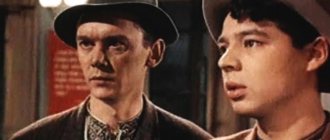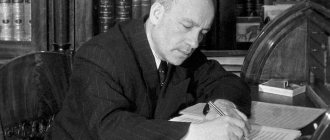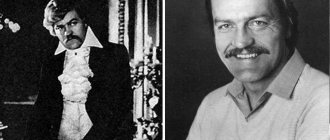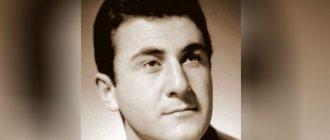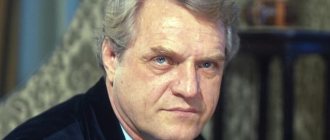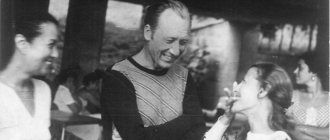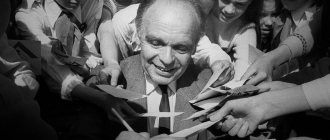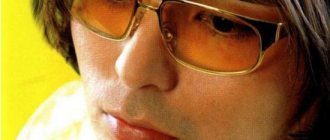Leonid Utesov
| Birth name | Lazar Iosifovich Weisbein |
| Date of Birth | March 21, 1895 |
| Place of Birth | Odessa, Kherson Governorate, Russian Empire |
| Date of death | March 9, 1982 |
| A place of death | Moscow, USSR |
| Tools | vocals |
| Genres | jazz romance folk music pop music thug song |
| Awards and prizes |
"Uncle Elya"
Song "Steamboat". Leonid Osipovich Utesov
(real name
Lazar (Leizer) Iosifovich Weisbein
; March 9 (21), 1895 - March 9, 1982) - Soviet pop artist, singer and orchestra leader.
People's Artist of the USSR (1965, the first pop artist to be awarded this title). Utyosov performed songs in various genres from jazz to urban romance. He acted in films.
[edit] Biography
Lazar Weisbein was born on March 9 (21), 1895 [Note. 1]) March 1895 in Odessa, in the large Jewish family of a small businessman (according to other sources - a forwarder at the Odessa port) Osip (Joseph) Kalmanovich Weisbein and Malka Moiseevna, nee Granik. He studied at the Faig Odessa Commercial School, but was expelled, according to Utesov himself, for smearing the clothes of a teacher of the Law of God with chalk and ink in retaliation for a remark. 2].
At the same time, he took violin lessons.
For some time he performed in the traveling circus of wrestler Ivan Borodanov as a gymnast. In 1912, he got a job at the Kremenchug Theater of Miniatures, at the same time he began performing under the pseudonym Leonid Utesov.
In 1913 he joined the Odessa troupe of K. G. Rozanov, before the revolution of 1917 he played in a number of theaters, such as the Bolshoi Richelieu, Maly Richelieu, Kherson Theater of Miniatures, and the traveling theater of miniatures "Mosaic". In 1917 he won the couplet competition in Gomel. In the same year he came to Moscow, where he performed in the capital's Hermitage Garden. In 1919, he appeared in films for the first time, playing the role of lawyer Zarudny in the film “Lieutenant Schmidt - Freedom Fighter.”
In the 1920s he continued to perform on stage and play in various theaters in Moscow, Leningrad (where he moved in 1922) and Riga. His film career also continued.
In 1928, in Paris (where he was with his wife and daughter as a tourist), Utesov heard the American jazz orchestra of Ted Lewis, who amazed him with what Utesov himself later called “theatricalization.” Upon returning to Leningrad, he created his own “Thea-jazz”, the first performance of which took place on March 8, 1929 on the stage of the Leningrad Maly Opera Theater. The success was significant, and from that moment on, Utesov actually changed his profession, becoming the leader (for the first year, together with trumpeter Yakov Skomorovsky) of a jazz orchestra. Utesov's team performed Western hits and specially written instrumental compositions and songs. The latter gradually took the main place in the orchestra's programs.
A major role in the development of Utesov as a musician and artist was played by his personal and creative friendship with the composer Isaac Dunaevsky, who wrote for Tea Jazz, in particular, jazz “rhapsodies” - arrangements of Russian, Ukrainian and Jewish (in Yiddish) songs, as well as There are many songs based on poems by modern Soviet poets.
In 1934, the film “Jolly Fellows” was released with Utesov in the title role and with the participation of his orchestra (the music for the film was written by I. Dunaevsky, the lyrics by V. Lebedev-Kumach). The success of the film brought Utesov enormous popularity and fame throughout the country.
During the war, Leonid Utesov traveled to the front many times and spoke to the soldiers. Repeatedly during such trips he found himself in dangerous situations, under bombing.
After the war, Utyosov and his orchestra continued to travel extensively around the country, record on records, perform on the radio, and then on television. In recent years, Leonid Osipovich has not performed with the orchestra (except for isolated cases when he performed 1-2 songs).
Leonid Utesov died on March 9, 1982 in Moscow. He was buried at the capital's Novodevichy cemetery (site No. 9)[1]. On the house where he lived from 1970 to 1982. (Karetny Ryad, 5/10), a memorial plaque has been installed.
In 1982, Triangular Lane in Odessa, where Utesov was born and lived, was renamed Utesov Street.
Brief chronological biography
- 1912 . The appearance of a pseudonym, which, together with the artist himself, became a legend. Lazarus searched for a long time for a bright, sublime name. The names of Skalov, Gorov, and Kholmov came before him, and the choice fell on Utesov. Lazar Weisben became Leonid Utesov.
- 1913 . Beginning of collaboration with the Rosanov Theater, simultaneous performance at the Richelieu Theater. During these years, stagecraft flourished, and Leonid Utesov gradually became a good professional.
- 1917 . The festival of coupletists in the city of Gomel is the first serious victory of the musician-singer. In the same year, he organized a troupe and began touring with them in the Hermitage Garden and near Moscow.
- 1919 . The cinematic page of the artist’s biography begins with the image of lawyer Zarudny in the film “Lieutenant Schmidt – Freedom Fighter.”
- 1923 . New role – Petlyura in the film “Entente and Co.”
- 1928 . First visit to the capital of France, Paris. Here a mysterious acquaintance with jazz took place, which changed all the musician’s thoughts.
- 1929 . Theatricalization of jazz music, the idea of an interesting program for your orchestra. A year later the program was updated, the group gave concerts with brilliant works by composer Isaac Dunaevsky.
- 1931 . Role in the production of “Conditionally Murdered” from the Leningrad Music Hall, where Utesov’s partner was the famous Klavdia Shulzhenko.
- 1934 . Release of the film “Jolly Guys”. The audience remembered Leonid Utesov and the bright notes of his orchestra.
- 1935 . The appearance in the repertoire of a very significant work - the song “From the Odessa Kachman”. The song was banned by the authorities and was rarely performed by the singer. But later Stalin himself asked to sing a song for the Chelyuskin sailors.
- 1936 . The appearance of songs written specifically for Utesov. One of these, called “Once Upon a Brave Captain,” was not included in the singer’s repertoire.
- 1937 . Performance with a new program “Songs of my Motherland” in collaboration with his daughter, singer Edith.
- 1939 . Participation in the filming of the video. Leonid Utesov was the first participant among the USSR artists.
- 1941 . Creation of a new program “Beat the Enemy” for performances at the front.
- 1942 . Awarding the title “Honored Artist of the RSFSR.”
- 1942-1945 . Incredible popularity with military-patriotic songs performed by the orchestra and the singer himself.
- 1945 . Participant in the victory concert in the heart of Russia, Moscow.
- 1947 . Formation of the Leonid Utesov Jazz Orchestra into the Variety Orchestra of the RSFSR.
- 1951 . The first sound of the legendary composition “By the Black Sea”, which became the song of the city of Odessa and the composer’s native land.
- 1954 . Production of the variety play “Silver Wedding”.
- 1965 . Awarding the title "People's Artist of the USSR".
- 1981 . The onset of health problems, especially with the heart. Leaving the stage.
- 1982 . Death of Leonid Utesov. He was buried in the Novodevichy cemetery in Moscow.
[edit] Personal life
Leonid Utesov was married twice: from 1914 to Elena Osipovna Lenskaya (1892-1962) and from 1982 (during the last 2 months of his life) to Antonina Sergeevna Revels (1923-1997; she worked in the Utesovs’ apartment for many years , and the official marriage provided her with housing - she was left with the Utesovs’ apartment). The daughter from his first marriage, Edith Leonidovna Utesova (1915-1982)[2], was a soloist in his orchestra (her husband is director Albert Aleksandrovich Gendelshtein). He performed many songs in a duet with her, in particular, the widely known “My Dear Muscovites”[3].
Utesov Leonid Osipovich - Lazar Leizer Iosifovich Weisbein
Soviet pop artist. 1895–1982
Leonid Osipovich Utesov (Lazar (Leizer) Iosifovich Weisbein) was born on March 21, 1895 in Odessa into a large Jewish family of small businessman Osip (Joseph) Kalmanovich Weisbein and Malka Moiseevna.
Leonid studied in Odessa at a commercial school, from where he was expelled in 1909 for poor academic performance and low discipline. After a short time working in a traveling circus (as a gymnast), he returned to Odessa, where he learned to play the violin. In 1912, he got a job at the Kremenchug Theater of Miniatures and took the stage name Utesov. As Leonid Osipovich said: “... I decided to take a surname that no one else had ever had before, that is, simply invent a new one. Naturally, all my thoughts revolved around the hill... Cliffs? – flashed through my head... Yes, yes! Utesov! Precisely Utyosov!”
In 1913 he joined Rozanov's Odessa troupe, and before the revolution he played in a number of theaters.
In 1917, Utesov won a couplet competition in Gomel and went to Moscow, where he performed in the capital’s Hermitage Garden. On October 26, 1898, the Moscow Public Art Theater under the direction of Stanislavsky and Nemirovich-Danchenko was opened at the Hermitage Theater with the premiere of the play “Tsar Fyodor Ioannovich.” The premieres of Chekhov's plays “The Seagull” and “Uncle Vanya” took place on the same stage. Opera performances by Mamontov's troupe were staged here, and Rachmaninov made his debut as a conductor of the Russian Private Opera. Benefit performances by Chaliapin took place, Sobinov, Nezhdanova, Vyaltseva, and Vavich sang.
Sarah Bernhardt, Ernesto Rossi, Gustavo Salvini toured here. The outstanding Russian ballerina Anna Pavlova performed here.
In 1919, Utesov acted in films for the first time. In 1921-28 he played in such theaters as the Theater of Revolutionary Satire (Moscow), the Musical Comedy Theater, the Palace Theater, the Free Theater (Leningrad), and Marine (in Riga). In 1925 he starred in two films.
In 1928, while on a tour with his family in Paris, Utesov heard the American jazz orchestra of Ted Lewis, who amazed him with what Utesov himself later called “theatricalization.”
Upon returning to Leningrad, he created his own “Thea-jazz”, the first performance of which took place on March 8, 1929 on the stage of the Leningrad Maly Opera Theater.
The success was significant, and from that moment Utesov became the leader (for the first year, together with trumpeter Yakov Skomorovsky) of the jazz orchestra. At that time, Utesov’s team performed Western hits and specially written instrumental compositions and songs, which gradually took the main place in the orchestra’s programs. This was a completely new genre for the stage of that period. Utesov combined conducting with entertaining, dancing, singing, playing the violin, and reading poetry. Various scenes were played out between the musicians and the conductor. The entire performance was unified by the director, starting with the introduction to the audience and ending with the farewell song “Bye,” which was broadcast using a movie screen and loudspeakers installed on the façade of the concert building.
A major role in the development of Utesov as a musician and artist was played by his personal and creative friendship with the composer Dunaevsky, who wrote for “Thea-jazz”, in particular, jazz “rhapsodies” - arrangements of Russian, Ukrainian and Jewish (Yiddish) songs, as well as many songs based on poems by modern Soviet poets. In the early 1930s, songwriter Lebedev-Kumach, at the request of Utesov, wrote new lyrics for songs. The orchestra’s second program, “Jazz on the Turn” (1930), consisted of orchestral fantasies on the themes of folk songs and four rhapsodies written by Dunaevsky - “Russian”, “Ukrainian”, “Jewish” and “Soviet”. The popular melodies “On Saturday is a stormy day”, “Vyut vitry” and others sounded in a new way. Subsequently, Utesov often included jazz interpretations of melodies of the peoples of the USSR in his programs, explaining it this way: “If American jazz has Negro folklore, then why can’t we have Georgian, Armenian or Ukrainian?”
In 1933, the play “Music Store” appeared in the group’s repertoire. In one scene, the orchestra parodied mechanized, soulless jazz, performing the aria of an Indian guest from Rimsky-Korsakov’s “Sadko,” “The Heart of a Beauty” from Verdi’s “Rigoletto,” and some themes from Tchaikovsky’s “Eugene Onegin,” arranged in foxtrot rhythm by Dunaevsky.
The orchestra's next program, “Carmen and Others,” continued its successful jazz interpretations of classical music. In it, episodes of the famous opera were played out comically with Bizet's music.
In 1934, the film “Jolly Fellows” was released with Utesov in the title role and with the participation of his orchestra (the music for the film was written by Dunaevsky, the lyrics by Lebedev-Kumach). The songs gained great popularity. The Congress of Peace and Friendship with the USSR held in London (1937) ended with the “March of the Cheerful Children.”
In 1937, the Utesov jazz orchestra presented the program “Songs of My Motherland” in two parts. The first part included songs about the civil war (“Tachanka”, “Polyushko”), the second consisted of lyrical and comedic songs. The program lasted for several years, until the beginning of the Great Patriotic War.
In 1938, Utesov, as artistic director, produced the play “Two Ships”, in which the songs “Varyag”, “The Sea Spreads Wide”, “Sailors”, “Red Fleet March”, “Ballad of the Unknown Sailor” were performed.
In 1939 he wrote his first book, “Notes of an Actor.”
He played, sang and conducted the orchestra in the film concert “Steamboat”, which is rightfully considered the prototype of modern video clips.
In 1941, Utesov’s orchestra rehearsed a new program “Humming, Joking and Playing” in the Moscow Hermitage.
The war has begun. The orchestra in a short time creates the first military program “Beat the Enemy!”, in which, along with already known songs, new works are sounded: “And more than once or twice we taught the enemy,” “Partisan Moroz-ko,” “Greetings to the sea wind.” During the first year of the war, the orchestra gave over 200 concerts in factories, ships, and in the army on the Kalinin Front, constantly including new songs in the program: “Wait for me,” “In the dugout,” “Dark Night,” “Odessa Bear,” satirical anti-fascist ditties “No mercy for bastards!” Repeatedly during such trips, the orchestra found itself in dangerous situations, under bombing.
In June 1942, Leonid Utesov was awarded the title of Honored Artist of the RSFSR
The second program of the war years was a response to the beginning of serious successes of the Red Army. It included the following songs: “Farewell”, “Steamboat”, “Ten Daughters”, “Two Friends”, “Song of War Correspondents”, “What are you yearning for, comrade sailor?”
In 1944, the orchestra presented a new jazz fantasy “Salute”, which featured excerpts from symphonic works, over twenty old and new songs, lyrical and satirical interludes.
On May 9, 1945, in front of a huge crowd of people, Utesov performed with an orchestra on an open stage on Sverdlov Square in Moscow.
For the 800th anniversary of Moscow in 1947, the Utesovsky ensemble prepared an orchestral fantasy “Moscow”, in the finale of which Dunaevsky’s song “My Dear Muscovites!” was performed for the first time. Utesov’s daughter, Edith Leonidovna, who had been a soloist of his orchestra since 1936, performed this song in a duet with her husband, director Albert Gendelstein.
In 1952, the program “Music of the Fat People” appeared, the central place of which was occupied by satire on international topics. The 25th anniversary of the group (1954) was celebrated with the variety show “Silver Wedding,” in which, among others, Utesov performed one of Dunaevsky’s last works, “I Gave Everything to the Song.” The song was included in the film "Merry Stars".
In March 1960, the program “Thirty Years Later” was presented at the Moscow Variety Theater. In it, along with the usual repertoire, the orchestra performed complex classical works – Prokofiev’s march from the opera “The Love for Three Oranges” and Debussy’s play Reverie. The difference from Western, supposedly purely dance jazz, was emphasized by the parody number “The Evolution of Western Dance.”
In 1965, Leonid Utesov was awarded the title of People's Artist of the USSR. He became the first pop artist to be awarded this title.
In recent years, Leonid Osipovich has not performed with the orchestra (except for isolated cases when he performed 1-2 songs). Utesov wrote another book, “Thank you, heart!”, led an orchestra, and acted a lot on television. In December 1981, Utesov's last performance took place. Leonid Osipovich said: “I don’t sing with my voice - I sing with my heart!”
Leonid Utesov died on March 9, 1982 in Moscow.
He was buried at the capital's Novodevichy cemetery.
Material created: 07/14/2015
Raikin Arkady Isaakovich
Home page
[edit] Origin of the pseudonym
Odessa artist Skavronsky invited Weisbein in 1912 for his miniature. But at the same time he set a condition: “No Weisbeins!”
... and I decided to take a surname that no one else had ever had before, that is, simply invent a new one.
Naturally, all my thoughts revolved around the hill. I would willingly become Skalov, but there was already an actor Skalov in Odessa. Then maybe become Gorsky? But Gorsky was also in Odessa. There were Gorev and Gorin - what happened in Odessa! But, besides mountains and rocks, there must be some other elevations in nature. Hill, for example. Maybe become Kholmsky or Kholmov. No, there is something sad about this, something like a cemetery - a burial mound... - What else is outstanding on earth? — I thought painfully, standing on Langeron and looking at the cliff with the fishing hut. “My God,” I thought, “cliffs, there are still cliffs!” I began to turn the word this way and that. Utyosin? - It’s not good - there’s something rustic, small, insignificant in the ending... - Utyosov? - flashed through my head... Yes, yes! Utesov! Precisely Utyosov! Probably, Columbus, seeing the outlines of the earth after three months of sailing, that is, having discovered America, did not experience such joy. And today I see that I did not make a mistake.[4].
Russian postage stamp from the series “Popular Russian Pop Singers”, dedicated to Leonid Utesov, 1999, 2 rubles (ITC 535, Scott 6542)
Childhood and family of Leonid Utesov
Utesov’s hometown is Odessa.
The name given to him at birth was Lazarus Weissbein. The family of the future singer had many children. As a boy, he dreamed of becoming a fireman; as he grew up a little, he began to dream about ships. He never thought about any theater or stage. Having entered a commercial school at the age of eight, he never graduated and was expelled. Most of the time he did not study, but sang in the choir, tried to play in the school’s brass band, participated in skits, but fell behind in his studies. Due to his irrepressible nature, he always received reprimands for bad behavior. Thus ended Utesov’s studies. By that time he was already fourteen years old. Despite the fact that he had no musical education, he, without embarrassment, sang in the streets, played the violin and guitar. At the age of fifteen, the teenager began performing in the circus. Utyosov entered the arena as a gymnast. Together with the circus troupe, the future singer traveled to major Ukrainian cities. All this time he studied playing the violin.
Leonid Utesov's songs were fantastically popular
Since 1912, Utesov was an artist at the Kremenchug Miniature Theater. He played several musical instruments. Having come up with a pseudonym, under which the whole world soon recognized the young man, he became Leonid Utesov.
[edit] Bibliography
- Utyosov L. O.
Notes of an actor. - M., 1939. - Utyosov L. O.
With a song through life. - M., 1961. - Beilin A.
Leonid Utesov. // In the book: Imaginary concert. Stories about the masters of the Soviet stage. - L., 1971, p. 102-105. - Utyosov L. O.
Thank you, my heart! Memories, meetings, thoughts. - M., 1976. - Bulgak L. G.
Leonid Utesov. // In the book: Soviet pop singers. [Vol. 1.] - M., 1977, p. 3-20. - Dmitriev Yu. A.
Leonid Utesov. - M., 1982. - Skorokhodov G. A.
Soviet pop stars. - M., 1982; 2nd ed.: M., 1986 (in part, chapter “Utyosov’s Secret”, pp. 18-33, 2nd ed. pp. 25-43). - Revels A.S.
Near Utesov. - M., 1995. - Unknown Utesov. Comp. G. A. Skorokhodov. - M., 1995.
- Akimov V.V.
Leonid Utesov. - M., 1999. - Hort A. N.
King and retinue. Funny pictures from the life of Leonid Utesov, his friends and his Odessa. - M., 2000. - Skorokhodov G. A.
Leonid Utesov on the stage, on records and in films. // In the book: Skorokhodov G. A. In search of the lost. - M., 2000, p. 3-24. - Utyosov L. O.
Forgive, farewell, Odessa-mother! (Poems. Compiled by A. G. Ivanov). - M., 2003. - Pogadaev V. A., Pogadaeva P. V.
P. Ramli and Leonid Utesov: parallels of creativity. // In the book: Malayan-Indonesian studies. Issue 16. M., Nusantara Society, 2004, p. 208-218. - Pogadaev Victor, Pogadaeva Polina.
Ramlee and Leonid Utesov: Parallels of Creativity. // In the book: P. Ramlee di Cakera Nusantara. Editor Awang Azman Awang Pawi, Khor Chooi Lian. Universiti Malaysia Sarawak, Kota Samarahan, 2005, p. 239-249. - Skorokhodov G. A.
Disks of Leonid Utesov. // In the book: Skorokhodov G. A. Secrets of the gramophone. Everything unknown about records and recording stars. - M., 2004, p. 36-57; Breakaway Yakov Skomorovsky. // Ibid., p. 57-65. - Safoshkin V.D.
Leonid Utesov. - M., 2005. - Geyser M. M.
Leonid Utesov (series “Life of Remarkable People”). - M., 2008. - Klitin S. S.
Tea-jazz by L. Utyosova. // In the book: Klitin S.S. History of pop art. Textbook. - St. Petersburg, 2008, p. 342-345. - Nadezhdin N. Ya.
Leonid Utesov: “You don’t want peace...”: [biography. stories] (series “Informal biographies”). - M., 2011.
History of music
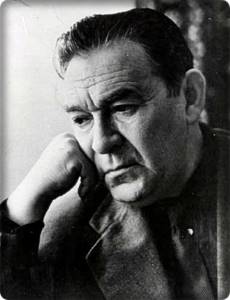
Pop singer, musician, film actor, leader of a jazz band, dancer, verse singer, spoken word artist, circus acrobat, juggler and even a clown... It’s hard to believe, but all these professions were brilliantly mastered by one single person. The same one whom our entire country has known and remembered for almost a century. His name is Leonid Utesov.
In the early 1920s, a so-called “synthetic evening performance” called “From Tragedy to Trapeze” was staged in one small theater, where a wonderful artist performed in a wide variety of genres. The performance began with a scene from “Crime and Punishment”, where he played Raskolnikov, followed by the first act of the operetta “The Beautiful Helen” by Offenbach with Utesov in the role of Menelaus, then the sketch “American Duel”. The continuation was couplets, comic stories, and playing the violin as part of a trio. Then eccentric dances, operetta duets, a waltz with a professional ballerina, then romances and parodies with one’s own guitar accompaniment, circus acts, control of a comic choir... A wonderful performance, lasting from eight o’clock in the evening until two in the morning, ended with trapeze acts.
Biography. Still the beginning or already a continuation?
The biography of Leonid Utesov is full of bright, almost incredible events. Coming from Odessa, a city famous for its talents, without having any musical or even secondary education, the famous artist was a real gem. By his twentieth birthday, he had traveled with a traveling circus to almost all of Ukraine, and in his seventeenth year he was already active in creative work in Moscow.
Lazar Iosifovich Weisbein was born on March 9 (21), 1895 in Odessa. In 1912, while performing at the Kremenchug Theater of Miniatures, Lazar Iosifovich took a pseudonym, which became known throughout the world. He really wanted his acting name to have something unique and at the same time significant. After much thought, a solution was found. This is how Leonid Utesov appeared.
As a child, the future artist did not think about the theater at all - he simply had never been there. At first he wanted to be a fireman, then, having reached a more mature age - 10 years old, he decided to become a sailor. The boy studied at the Faig Commercial School, from which he was expelled in 1909 for poor performance and equally bad behavior. This, of course, could not break the stormy energetic nature.
The aspiring artist began to study the violin, played the guitar on the streets of his hometown, then performed on the trapeze and rings in traveling circuses and booths. Gradually he mastered the stage as a singer. In 1917 the first success came. At the couplet competition in Gomel, Utesov took first place. Soon after this, he organized a small orchestra and began performing in Moscow's Hermitage Garden.
Cinematography is a great art. But jazz!..
In 1919, Leonid Osipovich made his film debut. The first two films - “Lieutenant Schmidt - Freedom Fighter” and “Trading House “Ananta and Co”” were filmed in Odessa. This was followed in Leningrad by two films directed by Boris Svetlov - “The Career of Spirka Shpandyr” and “Aliens”.
Utesov wrote about these shootings: “...I starred in two big films that did not become masterpieces of cinematography and did not seduce me into moving into the great silent art. You understand that it’s difficult to turn me into a mute; it’s easier to turn me into a dead man.”
In 1928, Leonid Osipovich visited Paris and there he first became acquainted with professional jazz. Returning to Leningrad, he immediately assembled his own theater orchestra. The first program of the new group was called “Thea Jazz” and was very similar to the play “From Tragedy to Trapeze”. The following programs featured jazz fantasies on the themes of popular melodies, classical works and songs of various peoples of the USSR.
Utesov said about folk melodies in jazz: “If American jazz has Negro folklore, then why can’t we have Georgian, Armenian or Ukrainian?”
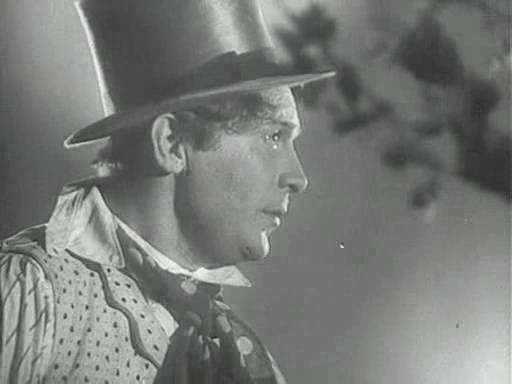
In 1933, Tea Jazz prepared the Music Store program. It played out episodes taking place in a music store. This program became the basis of one of the most popular Russian films - “Jolly Fellows”, filmed by G. Alexandrov in 1934. V. Lebedev-Kumach wrote the verses of the songs for the film precisely at the request of Utesov, who did not like the original versions. These songs - “March of Merry Children” and “Heart, you don’t want peace” - became a symbol of our country in the 1930s.
Already at the pinnacle of fame.
In 1936, Leonid Osipovich’s daughter, Edith, began performing with the orchestra.
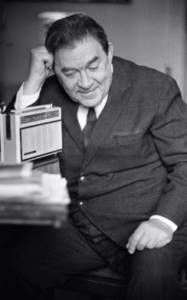
In 1939, the film concert “Steamboat” appeared, in which Utesov sang, played and conducted. Modern video clips originate from this tape.
During the Great Patriotic War, Utesov’s team gave concerts for front-line soldiers, constantly expanding their repertoire with new songs. This is how “Wait for Me”, “In the Dugout”, “Dark Night”, “Odessa Bear”, “Farewell”, “Steamboat”, “Ten Daughters”, “Two Friends” appeared. The orchestra celebrated May 9, 1945 with a performance on Sverdlov Square in Moscow.
In 1947, in the program prepared for the 800th anniversary of Moscow, the song “My Dear Muscovites!” was performed for the first time.
The first of the pop artists, in 1965, Utesov received the title of People's Artist of the Soviet Union.
Leonid Osipovich Utesov passed away on March 9, 1982 in Moscow.
The most up-to-date information on the bushing for the auger of the Zelmer meat grinder is on our website.
[edit] Links
- List of songs performed by L. O. Utesov
- Leonid Osipovich Utesov
- Pride of Ukraine - Leonid Osipovich Utesov
- “Thank you, heart...” (about Leonid Osipovich Utesov) // Lev Arkadyev “Trud”, March 23, 2000.
- Leonid Osipovich Utesov. Actor's tales
- Leonid Utesov: myths and reality
- Leonid Utesov on the website “Jazz in Russia”
- Razumny V. A. Memoirs of a contemporary about L. O. Utesov
- Cartoon “Old Record” on the themes of popular songs performed by Leonid and Edith Utyosov (“Soyuzmultfilm”, 1982, dir. Vyacheslav Kotyonochkin, 00:15:36)
- [2] Clip of L. O. Utesov’s performance of the song “Tachanka”
- Saratov Jazz Orchestra Retro. Song by L. and E. Utesov “Mu-mu”.

